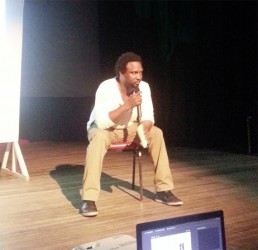In an effort to protect the intellectual property of artists and to provide them with an environment conducive to creating new work, the Janus Cultural Policy Initiative, conceptualised by local writer Ruel Johnson, was launched at the Theatre Guild on Friday evening.

The project, which is being spearheaded by Johnson and Sara Bharrat, aims to establish “a comprehensive and functional national cultural policy regime in Guyana.”
Bharrat asserted that it is often said that critics are popularly known for pointing out the problems but never offering solutions. “We are artists providing solutions to the problem,” she declared. According to her, the initiative is a project, which “remains independent from Guyana’s political and governmental problems.” She said “in order to fix the problem that exists, we need to generate cultural solutions, we need to open doorways, by doing this in a culturally fractured society, we can generate cultural solutions.”
Dubbed the mediator of Johnson, Bharrat indicated that the initiative has three major components, each of which have multiple sub-categories—research and analysis; education and capacity building; and advocacy.
“We’re planting seeds in the environment which has long term objectives,” she said. “We will plant seeds and let them grow to create the sort of environment we need to make culture a pillar in our environment, to make culture function as it should.”

The project is currently being funded by a €20,000 grant obtained by Johnson from the Prince Claus Fund for Culture and Development. Representa-tive of the fund, Dr. Peter deGroot, who is Honorary Consul of the Netherlands, explained that the grants are usually allocated to persons or organisations housed in places where the arts and culture are oppressed.
Johnson said that the initiative is an opportunity to “greenhouse young talent.” He opined that there has been no change in the writing environment since early 2000’s and this is something that must be remedied. According to him, “Arts have an integral role to play in fixing our problem, that role cannot be fulfilled if there is no proper environment.”
Dominique Hunter, an artist who is a former student of the E.R. Burrowes School of Art, opined that the facilities were limited and could not adequately cater to the needs of students. She said that students studying graphic art were at a major disadvantage simply because the school did not provide computers to facilitate their studies. According to her, people need to be educated about art and its value in society since society often deems art-oriented careers as hobbies and not valid professions.
Gino Persaud, Director of the Transparency Institute of Guyana, spoke at the event about “Culture and Corruption” and he emphasised the need for a policy which will allow for transparency in the cultural arena. He stated that the mismanagement of state funds in the cultural sector has been allowed to continue for an extensive period of time and must be stopped.
The launch also saw the screening of a short documentary by Rustom Seegopaul. It featured several Guyanese artists conveying their concerns about the industry and their struggle to support themselves financially in a country where art in most forms is not appreciated. One featured artist even said that there comes a point where someone has to stop doing what they love in order to support their family.
The launch celebrated local artists, such as the bands “Collage” and “Y3k,” as well as University of Guyana student Subraj Singh, who read a fragment of the short story which won the Walter Rodney Foundation writing competition. Samuel Bremmer, a performer who recited a poem at the event was described by Bharrat as an example of the struggle of poets. She related to the audience that Bremmer was in fact a homeless man living on the streets of Georgetown with a passion for the arts. Elsie Harry, another featured performer, delivered a spoken word piece about the discrimination many face every day simply because of their race.




